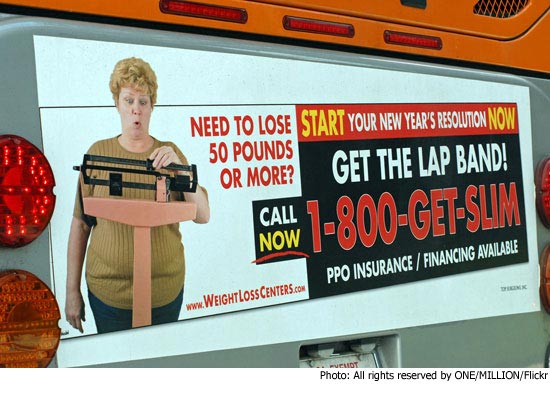Putting the squeeze on Lap-Band ads
December 20, 2011
County supervisors squared off Tuesday with promoters of the Lap-Band, featured on billboards all over Southern California but drawing increasing attention from officials concerned that the publicity blitz is obscuring a wide range of medical dangers.
After a series of sharp exchanges with representatives of 1-800 GET THIN, supervisors approved a motion by Supervisors Mark Ridley-Thomas and Zev Yaroslavsky to bring greater scrutiny to Lap-Band marketing and procedures. They directed county staff to, among other things, “develop a plan to identify medical products and services that are being marketed in a dangerously misleading manner.”
The supervisors’ action comes after the U.S. Food and Drug Administration recently sent letters to eight Southern California weight loss clinics and the 1-800 GET THIN marketing firm, warning that the company’s ubiquitous advertisements do not provide enough information about the risks of gastric bypass surgery or about the need to change eating behavior to lose weight over the long term.
“The FDA’s warnings raise significant concerns about the vulnerability of all County residents to these advertisements, particularly those who suffer from morbid obesity and wish to find a cure,” the motion said. “Medical experts and the FDA agree that the Lap-Band procedure is an aggressive treatment for obesity and should only be considered in clinically severe obesity cases.”
Robert Silverman, the president of 1-800 GET THIN, told supervisors that his firm is taking steps to bring its billboards and radio and TV spots into compliance with the FDA requirements. An attorney for the company said its surgery centers “have a better track record than just about anybody else.”
But supervisors were openly frustrated as they tried to find out more about how 1-800 GET THIN operates, in terms of referrals to clinics and responsibility for disclosing risks to potential clients.
“It’s been a long time since a witness or member of the public has come to that table and has obfuscated as consistently and persistently as you have today,” Yaroslavsky told the 1-800 GET THIN representatives. “I did not come here as a person who had any fundamental suspicion one way or the other about what you were doing. I leave here now thinking you are hiding something.”
The FDA’s action was prompted by Dr. Jonathan E. Fielding, the county’s top public health official, who last year asked the agency to investigate whether widespread Lap-Band promotion by 1-800 GET THIN was misleading.
The motion approved by supervisors Tuesday directed the Public Health Department to report back on what it is doing to get the word out about “safe and effective alternative methods to achieve and maintain a healthier weight.”
“There is no panacea for obesity, including the Lap-Band weight loss procedure,” the motion said. “However, there are proven strategies, when sustained over time, which can help people achieve a healthier weight, and decrease the risk for diabetes, heart disease and other chronic diseases.”
The motion also directed the County Counsel to provide legal options on steps the county could take to “ensure truthful advertising of aggressive obesity treatment procedures in unincorporated areas.” And it instructed the Chief Executive Office to pursue legislation to increase supervision and oversight of clinics that perform “aggressive and invasive obesity treatment cosmetic procedures.”
Posted 12/20/11
Top county doc wants lap band ad probe
December 8, 2010
L.A. County’s top public health official wants to put the squeeze on those ubiquitous LAP-BAND ads.
In a Dec. 7 letter to the U.S. Food and Drug Administration, Dr. Jonathan E. Fielding asks the agency to investigate whether widespread promotion of the LAP-BAND by the 1-800-GET-THIN weight loss clinics is misleading the public by failing to disclose enough about the potential risks of such surgery.
Fielding, the county’s director of public health, said while bariatric surgery can be appropriate for some severely obese patients, it’s not for “the vast majority of individuals, and should be reserved for those who have failed other approaches.”
He also took aim at the assertion in the advertising campaign that “Diets fail!” which he said undercuts the importance of healthy, common-sense lifestyle choices.
“Misleading advertisements erode the ability of the majority of the public, who are currently either overweight or obese, to fairly consider alternative weight management options, and for ‘normal’ weight individuals to be concerned about behavior that increases risk of weight gain,” Fielding said in the letter.
Fielding’s letter comes as Allergan, which manufactures the LAP-BAND system, is seeking approval to broaden the use of its product by allowing less obese people to use it. Lowering the standards to include people with a body mass index of 35, or 30 if they have other conditions, could mean more than 2 million people in L.A. County would be eligible for such surgery, Fielding said. Currently, most patients must have a body mass index of at least 40, or 35 with certain other conditions, or be more than 100 pounds overweight, to be considered eligible for LAP-BAND surgery.
An FDA advisory panel last week voted in favor of the proposed expansion to less obese patients.
Anyone who’s driven or watched television in Los Angeles County has likely seen the billboards and bus ads touting LAP-BAND and heard the 1-800-GET-THIN jingle. A sampling of the ads were included with Fielding’s letter to the FDA.
Misleading promotional messages, especially if the device becomes available to more people, may prove to be a disincentive to maintaining a healthy lifestyle because they create the “false impression that there is a very simple, fast, effective and permanent fix” for weight loss, Fielding said
In an interview, Fielding said one purpose of his letter is to have the FDA clarify who bears responsibility for fully disclosing any potential risks associated with a medical device.
A spokeswoman for Allergan said her company had no role in the billboard and current TV advertising campaigns. “Allergan doesn’t control, manage or have any input on those ads,” said spokeswoman Cathy Taylor, who said her company would not comment on others’ promotional efforts involving the device.
Representatives for 1-800-GET-THIN could not be reached.
Fielding’s letter was directed to Dr. Herbert Lerner, acting director of the FDA’s Reproductive, Gastro-Renal and Urological Devices Center for Devices and Radiological Heath.
Fielding urges Lerner to take steps to ensure that the LAP-BAND promotional campaign “does not constitute misbranding of a restricted device.”
Fielding is not alone in voicing concerns about the potential expansion of the device’s use. Others, including the National Women’s Health Network, a nonprofit advocacy group, and the National Research Center for Women and Families also have raised questions. Before voting in favor of the proposed expanded use for the LAP-BAND, the FDA advisory panel heard testimony from New York attorney Stephanie Quatinetz, whose 27-year-old daughter died after LAP-BAND surgery.
Posted 12/8/10













 405 bridge work causes a stink
405 bridge work causes a stink

